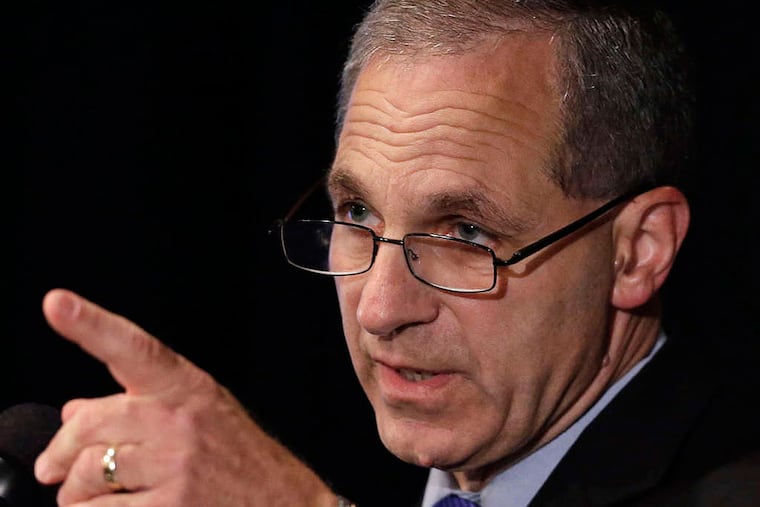Penn State offers lessons on leadership
By Luke Zubrod It's been three years since a child sex-abuse scandal rocked Penn State. Yet the wounds are still raw, as demonstrated by three recent events: Gov. Corbett's election loss; the decision by Penn State president Eric Barron to reexamine the Freeh report; and the release of internal e-mails from the NCAA that shed new light on its handling of the scandal.

By Luke Zubrod
It's been three years since a child sex-abuse scandal rocked Penn State. Yet the wounds are still raw, as demonstrated by three recent events: Gov. Corbett's election loss; the decision by Penn State president Eric Barron to reexamine the Freeh report; and the release of internal e-mails from the NCAA that shed new light on its handling of the scandal.
After the 2012 arrest of former coach Jerry Sandusky on child-molestation charges, the public and the Penn State community examined how key school leaders responded to the information they had about the abuse as it was happening. Today, we're focused on the failures of leadership since the scandal became public.
Perhaps the most underappreciated reason for Corbett's failure to be reelected was the public reaction to his handling of the Sandusky scandal. In the 2012 race for attorney general, Democratic candidate Kathleen Kane promised to investigate how Corbett, as attorney general, handled the Sandusky investigation. Implied in this promise was an accusation that Corbett had slow-walked the case to bolster his gubernatorial prospects.
As attorney general, Kane did look into the matter, and there was no indication of wrongdoing on Corbett's part. Indeed, many people regard the governor as a man of integrity. But Kane's success at the ballot box in 2012 suggests some public angst about the case. And Corbett's zigzagging responses - joining in the Penn State board's decision to oust coach Joe Paterno and later suing the NCAA on antitrust grounds - smacked of politics, feeding Kane's narrative.
Meanwhile, Barron's decision to reexamine the Freeh report reveals the Penn State community's unease with Freeh's conclusions and their importance in informing the NCAA's unprecedented sanctions. Freeh wrote that the failure of key leaders to protect children "reveals numerous individual failings, but it also reveals weaknesses of the university's culture."
Penn Staters bristled at the findings because they seemed inconsistent with decades of evident character displayed by Paterno, who had taken action in reporting potential abuse to his superiors. Additionally, broadening culpability to the university culture as a whole didn't ring true. Penn Staters have long prided themselves on upholding high standards of honor. The acts of a few are not indicative of the character of the many.
For the Penn State faithful, the greater transgression was the board's unreserved and hasty acceptance of the report. This seemed to be an act of penance for the hands-off oversight of the football program while the abuse was occurring. The board no doubt felt enormous pressure to act decisively and may have even believed it had no other options. But this hair-trigger response echoed the manner of Paterno's firing nine months prior. Both actions seemed designed to quell public outrage rather than being grounded in morality or justice.
The Penn State community may have different views on how Paterno and other school leaders handled abuse allegations, but that community is virtually united in its disdain for the NCAA sanctions. People are indignant at the NCAA's sweeping judgment of matters thought rightly addressed by law enforcement, as well as the NCAA's punishment of those who had nothing to do with the sex-abuse cover-up, including a $60 million fine, a four-year bowl ban, and the loss of 60 scholarships. This overreach seemed to be a response to long-running criticism of the NCAA for its lack of enforcement in general. And internal NCAA e-mails released recently as part of a lawsuit support this analysis. One NCAA official describes its posturing toward Penn State as a "bluff," apparently designed to avoid a more deliberative enforcement process.
The response to Penn State's sex-abuse scandal by key leaders contributes to our understanding of good leadership in crisis moments. We see more clearly that good leadership is judged not only by the quality of the decisions made, but by the equity of the process used to reach conclusions and take action. In response to the scandal, Corbett, school trustees, and the NCAA responded inconsistently, hastily, or indiscriminately.
President James Garfield once said, "I have seen the sea lashed into fury and tossed into spray . . . but I remember that it is not the billows, but the calm level of the sea, from which all heights and depths are measured." The still-smoldering controversies in Happy Valley remind us that leaders should fight their inclinations to pass judgment during the storm of public fury. Instead, they should absorb some of that fury while the storm rages, so that when the calm level is measured, their decisions stand the test of time.
A leader's job is not merely to render wise judgments about things that have already occurred, but also to consider how those judgments will affect the future. The lingering wounds at Penn State suggest that - in responding boldly to understandable public outrage - too many people in leadership positions failed to lay the groundwork for healing.